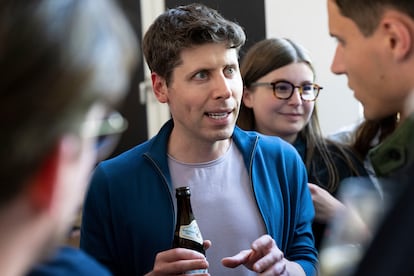Sam Altman: billionaire ChatGPT creator, startup guru and prohet of the apcalypse?
The OpenAI co-founder, who has been touring Europe all week, is a typical Silicon Valley character, also because of his controversial views

Sam Altman is the CEO of the company that has developed the fastest growing product in history: ChatGPT. While that’s an incredible achievement, it’s not the primary goal of OpenAI, his company. His aspiration is so-called “general artificial intelligence,” a system that itself replicates and enhances the capabilities of a human brain. At 38, Altman no longer has the youth of the classic tech founder, but he is a typical Silicon Valley character. His belief in the limitless power of technology is unwavering: “We have lost our collective sense of optimism about the future. We should all act as if regaining it is a duty. The only way I know of to return to that optimism is to use technology to create abundance,” he said in May in Toronto. Without that abundance created by technology there will be no democracy, he says.
Altman is so confident in technology that he is a poor salesman for his company’s current flagship product. He finds it lacking and highlights its shortcomings as well as its virtues. ChatGPT, a program developed with artificial intelligence (AI) that gives plausible answers to most questions, is for Altman an “impressive, but not robust” technology, as he stressed at a recent conference. “On the first test you have the reaction of ‘this is awesome, and it’s ready,’ but if you use it 100 times, you see its weaknesses,” he explained. The situation is a little like Don Quixote, but Altman’s windmills already have some solid walls, they’re not just daydreams. The entrepreneur likens his plan to achieve general AI to the Manhattan Project, which Robert Oppenheimer led to build the atomic bomb. As Altman likes to point out, he was born on the same day as Oppenheimer, on April 22.
He has an exaggerated confidence in general artificial intelligence, which is something we don’t even know is possible. And he is confident that it will become a reality: “The positive case is so unbelievably good that you sound like a crazy person talking about it. The worst possible event is that we all blow it,” he wrote on Twitter. Altman talks about these apocalyptic prophecies with the calm of someone having a beer with friends; he has, in fact, been doing so for years. In 2015, he wrote: “Popular topic of debate among my friends: will the end of the world be synthetic biology, AI, or energy shortages/war?”
popular debate topic among my friends: will the end of the world be synthetic biology, AI, or energy shortage/war?
— Sam Altman (@sama) March 17, 2015
Years before the pandemic, Altman had already embraced the prepper community, a group of people who are prepared to survive an apocalypse on Earth: “My problem is that when my friends get drunk they talk about how the world will end,” he expressed in a 2016 New Yorker magazine profile. “I try not to think about it too much, but I have guns, gold, potassium iodide, antibiotics, batteries, water, Israeli army gas masks, and a ranch in Southern California that I can fly to,” he added. In the aftermath of the pandemic, he still believes we haven’t seen anything: “This is unlikely to be the worst new pandemic we will see in our lifetimes,” he wrote on a post in his blog.
A couple of McLarens in the garage
For Altman, flying to his ranch is not an exaggeration. According to the man himself, one of his two great hobbies is renting airplanes to fly around California. The other is race cars: he has a couple of McLarens and a vintage Tesla, five cars in all. He also makes annual checklists of physical and business goals. He follows a vegetarian diet and intermittent fasting.
Altman grew up in St. Louis, Missouri. At the age of eight he was already tinkering with computers, as is de rigueur in these Silicon Valley success stories. In several interviews he has said that it was not easy to be a teenager and gay in that region of the U.S. in the early 2000s. His first Mac computer and online forums helped him share those secrets. In 2015, at a dinner with Elon Musk, Peter Thiel and other Silicon Valley godfathers, they decided to found OpenAI. Their goal was to compete with Google and DeepMind so that they wouldn’t be the only ones dominating the AI explosion in the future. Altman’s relationship with Musk ended, however. Musk wanted to take full power at OpenAI, but they wouldn’t let him, and he has been trying to torpedo their activity ever since.
Thiel, the driving force behind PayPal and Facebook, is one of his close friends. Before the pandemic, Altman said he would go into seclusion at Thiel’s home in New Zealand. Thiel, a Trump supporter and founder of Palantir, a company with access to sensitive data and dabbling in military technology, gives Altman a reputation as a shady character. Before the 2016 election, Altman had to explain that he did not support Trump, but would continue to work with Thiel.
3) Thiel is a high profile supporter of Trump. I disagree with this. YC is not going to fire someone for supporting a major party nominee.
— Sam Altman (@sama) October 17, 2016
OpenAI is the second startup co-founded by Altman. The first was Loopt, which he founded at 19 after dropping out of Stanford’s computer science program to develop. He received initial funding from YCombinator, a platform that quickly became famous for helping other technology companies arise, such as Reddit, Dropbox and Airbnb. He managed to sell Loopt (which allowed selective location sharing with others) for $43 million, although he expected much more. At 28, the founders of YCombinator offered him to run their platform: “He has a natural ability to convince people,” said Paul Graham, founder of that company and a leading figure in Silicon Valley. “I met Sam when I was 19, and I remember thinking at the time, ‘So this is what Bill Gates must have been like,’” he added.
Why do I want more money
Money doesn’t seem to be one of his priorities: “I’ve earned more than I’ll ever need,” he said. A year ago he went grocery shopping for his grandmother and later confessed to his mother that he hadn’t been to the supermarket in four or five years. He is more interested in power, according to Graham, and has investments in a lot of startups from which he has made a lot of money. From OpenAI, he claims, he only collects social security; he’s not in it for the profits. In 2016, he said he didn’t want too much: he was content with his house in San Francisco, his cars, his ranch in Southern California and a $10 million nest egg, the annual interest on which would cover his expenses. The rest, according to Altman, would be for the betterment of mankind.
Now that global success has come his way, legends from his past emerge. Altman is the typical young man who is told by his brothers that he should run for president, and he doesn’t see it as a joke. Altman speaks in a throaty voice and slowly, as if he likes to hear what his voice is going to say. The comparisons he’s already getting are naturally exorbitant: Kevin Scott, chief technology officer at Microsoft, whose company has invested $10 billion in OpenAI this year, told The New York Times that Altman will end up on the same plane as Steve Jobs, Bill Gates and Mark Zuckerberg.
While Altman is not obviously famous like a singer or athlete, his impact is greater. This week he spent 24 hours in Madrid as part of a global tour he has organized to listen and be heard. He has met, so far, with the presidents of Spain, France, the UK and Germany. After a talk at the IE University in Madrid, he spent half an hour chatting with students. They took pictures of him and people wanted to tell him their stories (something Altman himself expressly asked for). The conversation flowed as if at a cocktail party someone was attracting more attention, but in a polite way.
How to be successful
With his tenure at YCombinator, Altman also became a startup guru. In 2014, he gave a course at Stanford titled “How to Start a Startup.” There he provided this mathematical formula: “The outcome [of a startup] is something like idea [multiplied] by product, by execution, by team, by luck, where luck is a random number between zero and ten thousand. Literally. But if you do really well in the four areas you can control, you have a good chance of at least some amount of success.” This experience in the business world has led him to write posts on his personal blog with titles such as “How to be successful,” where there are phrases that illustrate his way of seeing the world: “One big secret is that you can bend the world to your will a surprising percentage of the time” or “Self-confidence is immensely powerful. The most successful people I know believe in themselves almost to the point of deluding themselves”.
great meetings today in warsaw, paris, and london. and…since i was out of the US, i finally got signed up for worldcoin! pic.twitter.com/VUouPyYDpa
— Sam Altman (@sama) May 23, 2023
His first startup, Loopt, was an app to share your location with selected friends and family, one of those ideas that seem good until they collide with the reality of complex human lives. Altman is now co-founder of Worldcoin, a company that aims to collect the irises of all human eyes to certify your identity. One of his stated purposes is that if general AI brings immense wealth into the world, that all that money can be distributed and it will be easier with humans already identified. He always promises as much privacy as possible, but these are approaches that seem to have little thought about their possible misuses. Work, for example, is only one of the problems of the future that he intends to solve: his investment in Helion, a nuclear fusion startup, is one of his major interests today.
The confusion between humans and machines may seem like a fantasy today, but it’s something Altman has been joking about for years. The New Yorker journalist who wrote his profile in 2016 joked that he went to the bathroom infrequently: “I’ll practice going to the bathroom more often so humans don’t realize I’m an AI,” he replied.
Sign up for our weekly newsletter to get more English-language news coverage from EL PAÍS USA Edition
Tu suscripción se está usando en otro dispositivo
¿Quieres añadir otro usuario a tu suscripción?
Si continúas leyendo en este dispositivo, no se podrá leer en el otro.
FlechaTu suscripción se está usando en otro dispositivo y solo puedes acceder a EL PAÍS desde un dispositivo a la vez.
Si quieres compartir tu cuenta, cambia tu suscripción a la modalidad Premium, así podrás añadir otro usuario. Cada uno accederá con su propia cuenta de email, lo que os permitirá personalizar vuestra experiencia en EL PAÍS.
¿Tienes una suscripción de empresa? Accede aquí para contratar más cuentas.
En el caso de no saber quién está usando tu cuenta, te recomendamos cambiar tu contraseña aquí.
Si decides continuar compartiendo tu cuenta, este mensaje se mostrará en tu dispositivo y en el de la otra persona que está usando tu cuenta de forma indefinida, afectando a tu experiencia de lectura. Puedes consultar aquí los términos y condiciones de la suscripción digital.









































